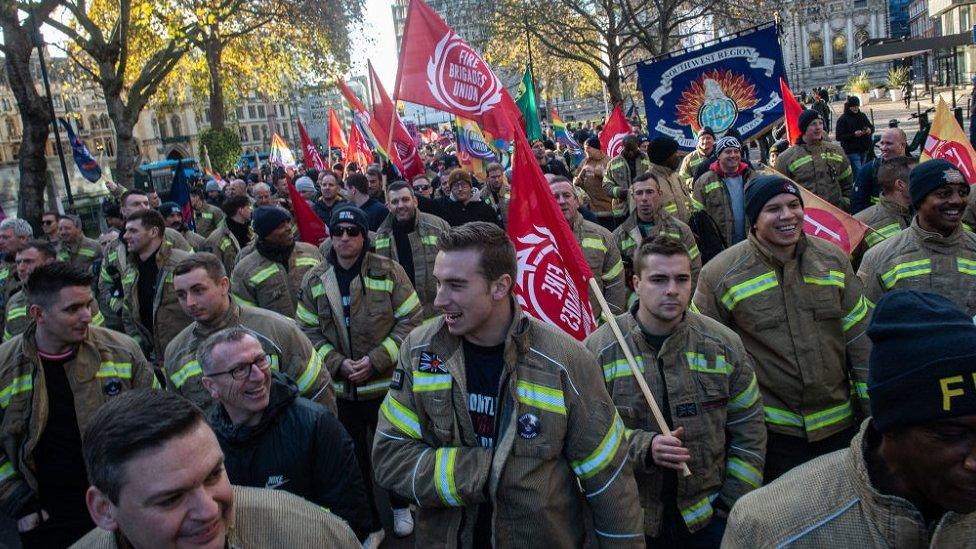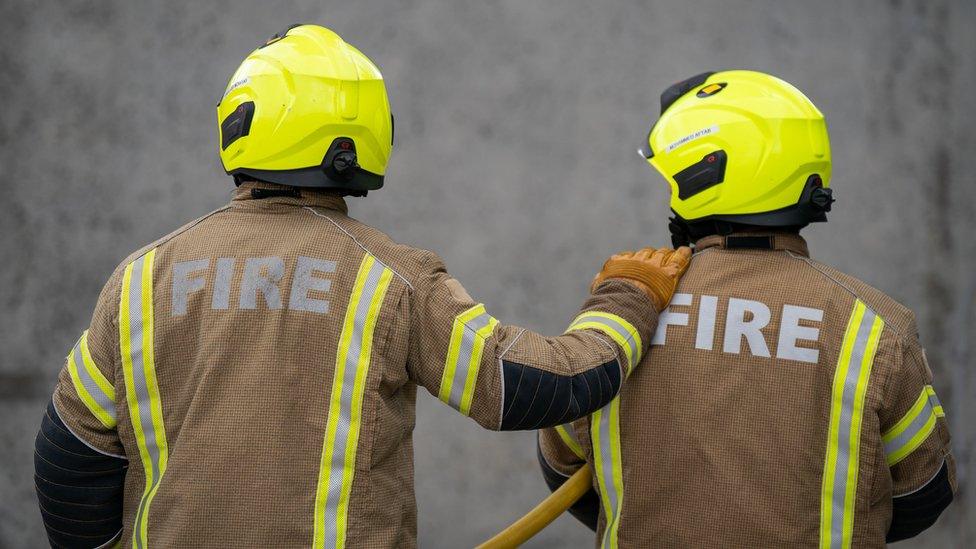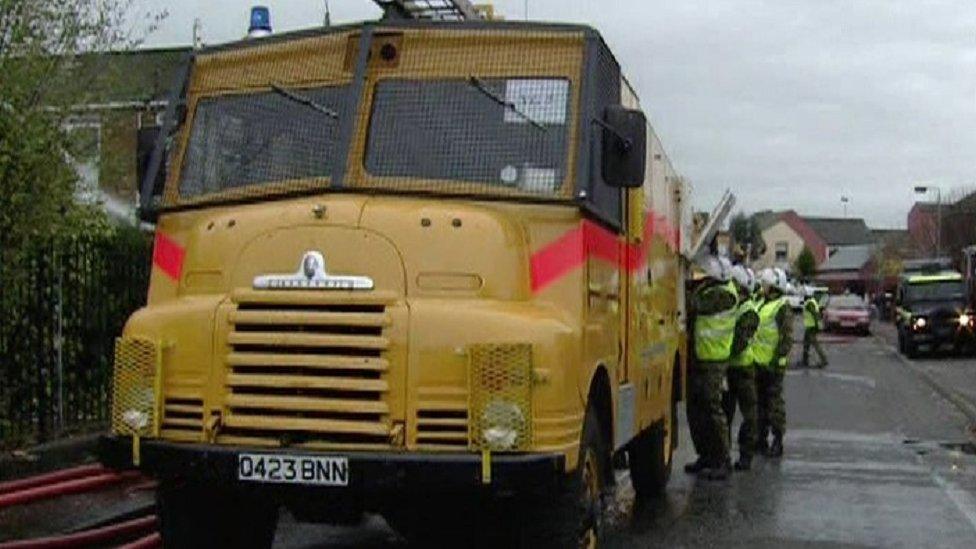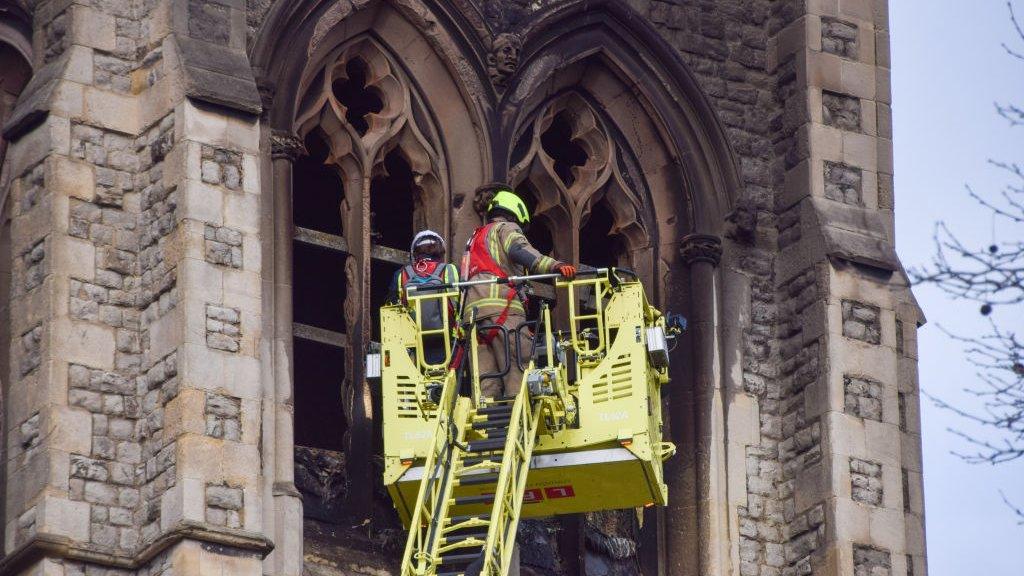94% of Northern Ireland firefighters vote to strike in ballot
- Published

Several thousand firefighters marched to parliament to lobby their MPs
Firefighters have voted overwhelmingly to strike over pay in Northern Ireland.
In a ballot on Monday, 94% voted Yes - the turn-out was 68%. The Fire Brigades Union (FBU) has given the government 10 days to respond.
Earlier, the fire services said all contingency options were being considered.
This could include bringing in the Army to cover callouts. In 2002, so-called Yellow Goddesses replaced fire engines on Northern Ireland's streets.
In the UK-wide ballot on industrial action by the Fire Brigades Union (FBU) 88% voted Yes on a 73% turnout.
The FBU said while it had a mandate to call firefighters out on strike, it would not announce any dates until it meets employers.
'Huge amount of anger'
Earlier on Monday, NI fire service boss Andy Hearn said he was considering requesting help from the Ministry of Defence if necessary.
The FBU said nobody wanted to see troops being deployed.
If the strike goes ahead, it will be the first nation-wide strike on pay since 2003.

FBU General Secretary Matt Wrack said this was an "overwhelming vote for strike action by Northern Ireland".
"The government has refused to make funding available for a decent pay offer to firefighters and control staff. We registered our pay claim in May 2022," he said.
"It's outrageous that, eight months on, we still do not have an acceptable offer from our employers."
Mr Wrack said firefighters were among Northern Ireland's "Covid heroes" who kept frontline services going during the pandemic.
"The prime minister has badly misjudged the public mood by imposing pay cuts on key workers," he said.
The FBU says firefighters have suffered a 12% drop in real terms earnings since 2010 - about £4,000 a year on average.

So-called Yellow Goddess Army vehicles were used to fight fires in Northern Ireland in 2002
Members rejected a below-inflation 5% pay offer in November before a strike ballot was officially opened on 5 December.
More than 32,000 members across the UK were balloted.
"While our members are very proud of the job they do and want to serve their communities, they've also got families to look after and bills, rent and mortgage to pay," said Mr Wrack.
"You can't just keep going on with your pay falling each year."
'Military aid'
Speaking after the ballot result, Mr Hearn, the interim chief fire and rescue officer in Northern Ireland, said he fully respected the outcome.
"I wholly support a pay increase for our firefighters and absolutely recognise the right of firefighters to participate in peaceful strike action," he said.
Mr Hearn added that contingency plans were being drawn up and discussions were ongoing with the FBU about special arrangements as regards high-risk calls, should a strike go ahead.
Previously he had said that should agreement not be reached with the FBU, "the need to request military aid to civil authorities from the Ministry of Defence will be progressed through further discussions with our sponsoring Department, the Department of Health."


Are you a member of the FBU? Share your experiences by emailing haveyoursay@bbc.co.uk, external.
Please include a contact number if you are willing to speak to a BBC journalist. You can also get in touch in the following ways:
WhatsApp: +44 7756 165803
Tweet: @BBC_HaveYourSay, external
Please read our terms & conditions and privacy policy
If you are reading this page and can't see the form you will need to visit the mobile version of the BBC website to submit your question or comment or you can email us at HaveYourSay@bbc.co.uk, external. Please include your name, age and location with any submission.
- Published30 January 2023

- Published29 December 2022

- Published1 August 2023
